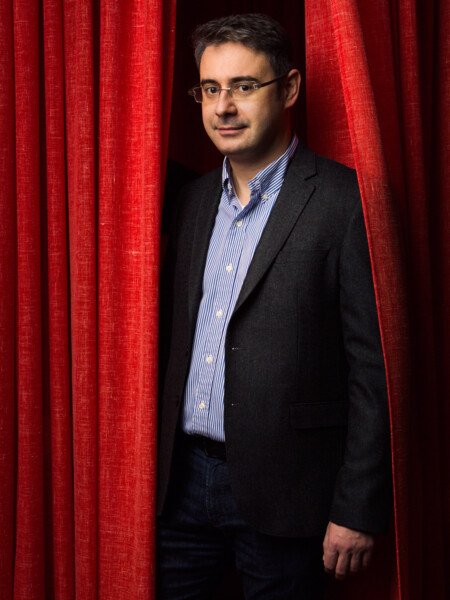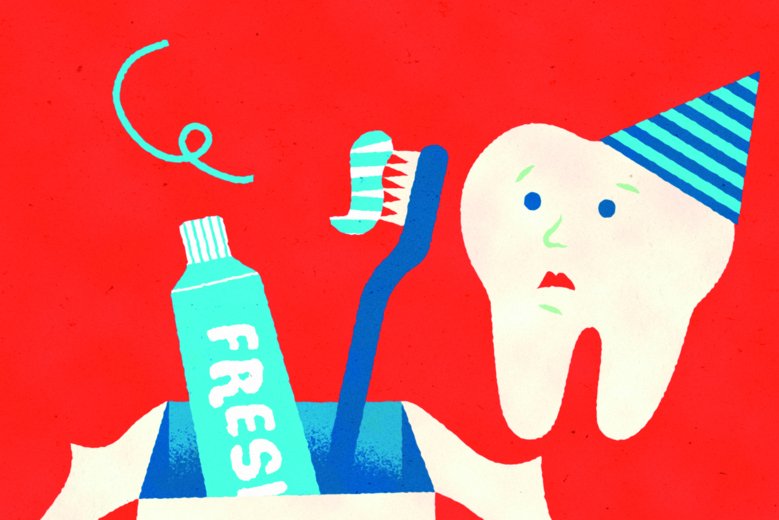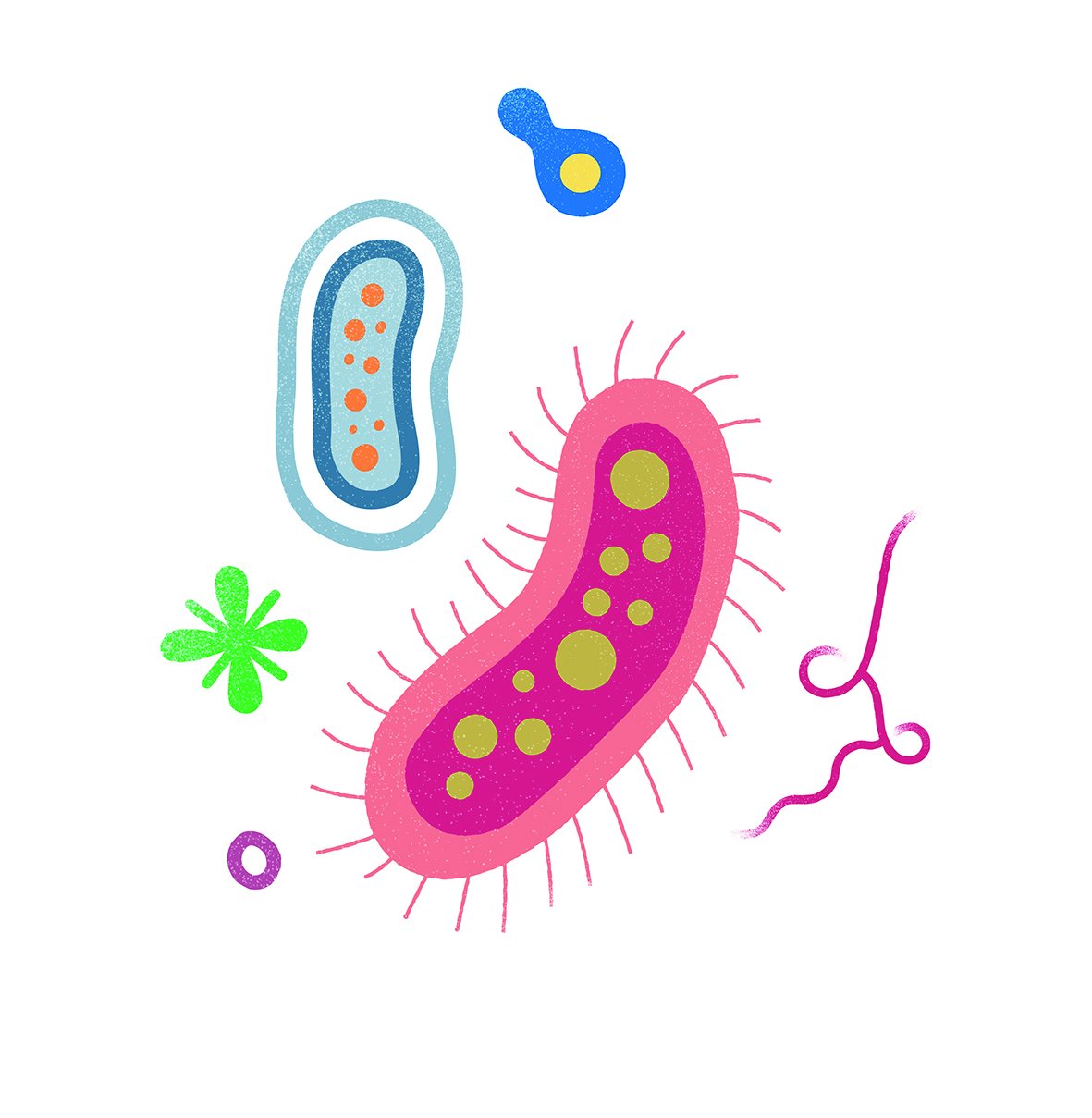A glimpse into another world
We use it to eat, speak and breathe with. But our mouth is also home to hundreds of different species of bacteria. How their lives relate to some of humanity’s most common diseases is what interests Professor Georgios Belibasakis.
Name: Georgios Belibasakis.
Title: Professor of Clinical Oral Infection Biology at the Department of Dental Medicine, Karolinska Institutet.
Age: 40.
Family: Wife Nagihan Bostanci, who also works as a Professor at the Department of Dental Medicine at Karolinska Institutet, and their two year old daughter.
Leadership style: I am team-oriented. More of a “Let’s do this!” person than a “Do it!” person.
My idea of relaxation: Spending time with my daughter. For the first time since childhood, I’m currently living next to water, and it is very restful to sit on the balcony and watch the boats sail by.
Inspired by: Often people working in completely different areas to my own, like sports or the business world. Winning a sporting contest is like when a researcher publishes an article in a scientific journal. Both involve a lot of work, pep talks, and planning which may not always be visible from the outside.

Text: Cecilia Odlind, first published in Swedish in Medicinsk Vetenskap no 4, 2016.
GEORGIOS BELIBASAKIS shows me a picture of an oral cavity. The patient has an aggressive form of periodontitis, an infection that rapidly destroys the periodontium. The gums are red and have receded, large parts of the discoloured teeth are visible. The overall impression is worn. But the patient is young and has practised good dental hygiene. It is probably more due to the patient being unlucky and having a genetic predisposition. This aggressive form of periodontal disease that affects some young people is one of the diseases Georgios Belibasakis wants to understand better through his research.
“The disease forces the man to visit the dentist often, he is plagued by aches and has difficulties chewing up the food. But that’s not all, he also has poorer self confidence. And he smiles less,” says Georgios Belibasakis.
For those of us who have a healthy oral cavity, it is perhaps easy to forget how important it is to our overall health. In Sweden and many other countries in Europe, we have been able to prevent to a good extent many oral diseases, for example, with the help of educating children about dental hygiene in schools and brushing with fluoride toothpaste the prevalence of cavities has decreased dramatically in just a few generations.
“However, the disease still exists and there is much we do not understand, such as why some people get cavities in their teeth much more easily than others. This is why microbiological and behavioural research is still necessary,” Georgios Belibasakis says.
And in the true spirit of odontology, Georgios Belibasakis’ main objective is prevention.
“We must ensure that anything that can be prevented is prevented. But when that is not possible, we must of course also have the right methods to diagnose early enough and provide a cure in the least invasive way,” he says.
APPROXIMATELY TEN PER CENT of the population suffers from severe periodontitis or periodontal disease, which together with tooth decay is the most prevalent of all human bacterial diseases. In order to understand the environment in which they thrive, Georgios Belibasakis’ research includes the composition of the bacteria in our mouths. There are over 700 different species of bacteria. After the gastrointestinal track´s bacterial flora, oral flora is the second most diverse bacterial ecosystem in our body.
“The figure is debated. Results from more modern methods of analysis have suggested significantly more species, the number could increase in the future,” says Georgios Belibasakis.
All of these bacteria normally live in our mouth - and we actually want them to. They keep our immune system active and their functions include preventing other dangerous bacteria from colonising the mouth. The actual bacterial composition varies between individuals and is influenced by different factors such as what and how we eat and whether we are under a lot of stress. Hormonal fluctuations and genetics also have an impact. But according to Georgios Belibasakis, the important thing is probably not only the combination of bacteria you have.
“We are not talking about a good or bad composition of bacterial flora. What we think right now is that we should look out for imbalances in the oral ecosystem instead. If a certain type of bacteria suddenly increases, it is a warning, that’s when the bacteria can cause disease,” he says.
Oral ill-health is therefore linked to changes in the normal bacterial composition rather than being infected by contaminants from the outside. Circumstances in the mouth’s environment affect this but more information is needed on how. Different individuals may also be more or less resistant to such changes in the environment, which can in turn lead to changes in microbial composition.
“Generally speaking, a stable bacterial flora is a good bacterial flora,” says Georgios Belibasakis.
IF WE DO NOT BRUSH OUR TEETH, various bacteria collect on the teeth and in the periodontal pockets. Together they form a thick layer called a biofilm. Antimicrobial molecules in saliva, that normally protect the teeth and gums from the noxious effects of bacteria, can't get through, so the bacteria can cause damage to the teeth or gums while being protected within the biofilm environment. In a similar way, antibiotics cannot get through either.
“I usually compare these biofilms that are made up of our "friendly" bacteria to a riot. They might be nice as individuals, but they can be dangerous as a group,” says Georgios Belibasakis.
To understand more about these processes, the research team is studying models of biofilm in the laboratory.
“There we can see how biofilms behave, how bacteria communicate with each other, but also how they interact with host cells,” says Georgios Belibasakis.
However, a lot of knowledge about what the importance of oral flora is for both local and general health is still missing.
“We are also working to identify and detect the specific bacteria that may be of interest from a health point of view. By carrying out a large-scale protein analysis of oral samples over time, we can sift out quite a few interesting proteins derived from bacteria and the host that increase during illness and look at how these are linked to the bacterial composition,” says Georgios Belibasakis.
In an EU project that the research team is involved in, the goal is to develop a mobile laboratory that can quickly analyse a range of factors in a saliva sample. This could be useful in countries where there are long distances to dental clinics and the hospital. But it could also be used to help dentists check things such as a patient's microbiological profile easily.
“In the future, you might even be able to take a test yourself at home. In the same way as you can detect a fever as a sign of infection, you would be able to detect changes in oral flora as a warning of impending dental disease,” says Georgios Belibasakis.
It is still not clear what the resulting action should be since sufficient knowledge is still missing. But one recommendation would simply be to visit the dentist or dental hygienist more frequently than usual for a while in order to monitor and prevent disease progression.
“It is easier to fix any problems at an early stage,” he says.
Dental hygienists are a professional group that Georgios Belibasakis wants to highlight.
“They are the backbone of preventive work. Because they meet lots of patients before they develop the disease, they have the potential to detect high-risk patients early. They should have more opportunities to engage in research,” he says.
ANOTHER MOUTH DISEASE that interests Georgios Belibasakis is peri-implantitis, which is an infection which can arise in connection with dental implants.
“It is a modern-day disease. Great technological advances have meant that we can help patients who are missing teeth to regain their functionality, which is a very good thing. But these advances also mean an increased risk of new types of complications that we must follow and research closely,” he says.
The common goal of all of the research that Georgios Belibasakis conducts is that he wants it to lead to benefits for patients.
“I believe that all of the experiments, even the smallest simple tests in the laboratory, should be carried out in order to answer questions about the process of disease or the improvement of health. We use our mouth when we eat, speak and breathe. I think we should look at oral health from a more holistic perspective, as an important part of the whole human being and overall health,” he says.
Georgios Belibasakis on ...
... oral health in the elderly: Periodontal disease affects most people sooner or later, and is therefore an ageing disease. By improving oral health checks for the elderly, I think we could make major contributions to their general health.
... academic leadership: Prospective leaders at all levels in academia should be properly trained, and I don't just mean a few courses here and there. Extended leadership training should exist for all who are supposed to become managers at universities and colleges.
... his most unexpected research findings: I don’t work with research expectations, but rather focus on the research question itself. I try to be open to the fact that the hypothesis may not be correct and let the results lead the way
... bad breath: This is mainly due to sulphur gases that are secreted by bacteria on the tongue and other hard to clean places. It is an example of how bacteria in the mouth affects health in many ways.
More reading
 Photo: Jens Magnusson
Photo: Jens MagnussonBetter dental health for everyone
Tooth decay affects those with a low level of income and education to a greater extent than other groups. Why that is, and what we can do about it, is the number one research question within the field of caries.

Diversity rather than simplicity
Lots of bacteria live on and inside our body. We would quickly get ill without them. Researchers at Karolinska Institutet are trying to find out more about "our friends the bacteria".
